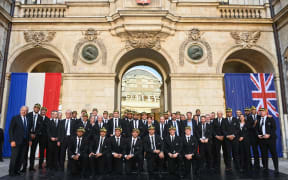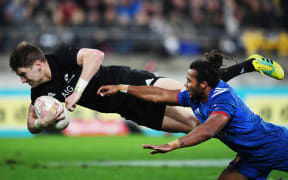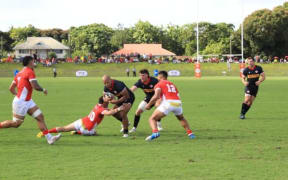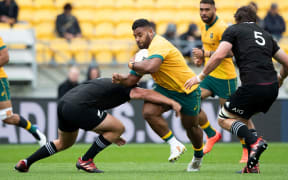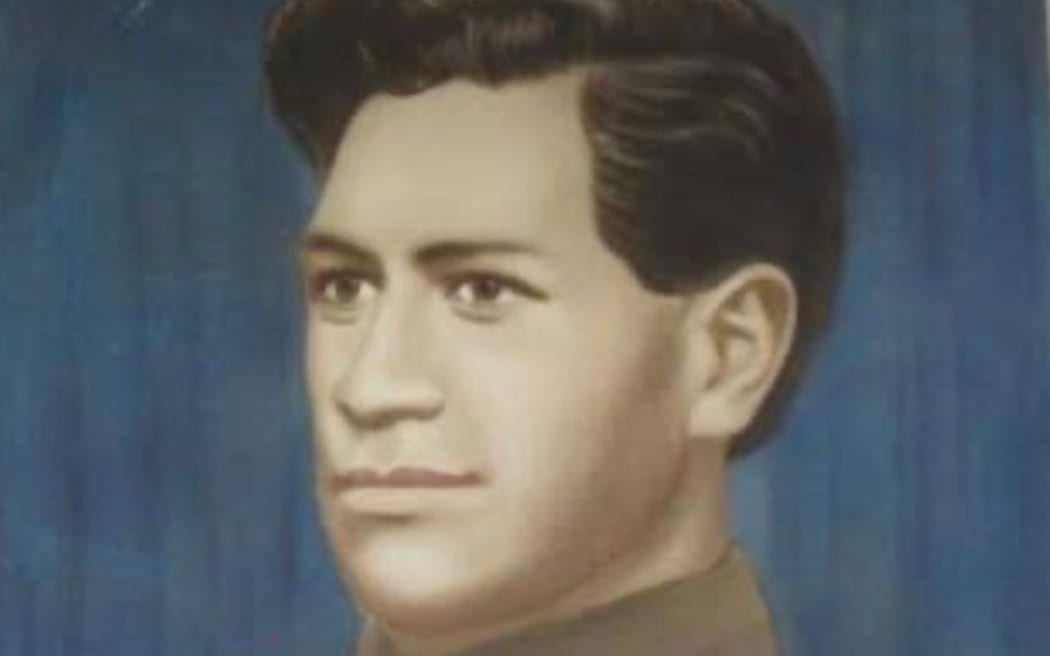
Private Richard Heperi, the great-great grandfather of All Black Tamaiti Williams. Photo: Supplied
It's hard not to like Tamaiti Williams. The 140kg Crusaders prop certainly epitomises the soft-spoken giant role in the All Blacks and has been the surprise package of good interview content so far in his debut season. Today in Lyon was no different, as he opened up about a unique revelation linking him to a distant past.
The All Blacks have a tradition of visiting World War I graves whenever they are on French soil, and last week was no different. The team travelled to Arras in the northeast, and it was there they were taken underground, through the history of one of the most harrowing experiences in the Great War and the New Zealand Expeditionary Force's role in it.
One of those men was Private Richard Heperi, a mill hand from Hokianga before he joined the Māori Pioneer Battalion in 1916. Along with 42 other soldiers from his unit, Heperi was tasked with digging part of the vast network of tunnels beneath the Arras fields during a battle that would claim the lives of 300,000 Allied and German combatants (to put the war's immense destruction, Arras isn't even in the top 10 highest casualty rates for WWI battles). Many have no known graves - buried deep under the earth by collapsed tunnels or simply vaporised by high-explosive artillery.
The All Blacks' battlefield tour guide showed Williams and his team mates a site on the side of the chalk cave walls where Heperi had carved his name and hometown.
After Williams posted footage of his visit to the Arras cemetery on Instagram, he received a surprising message from his mother telling him Heperi was in fact his great-great-grandfather and that he'd spent the day on and under the same ground as his ancestor had.
"I found out that my great-great-grandfather actually served in those tunnels," said Williams at the All Blacks' first official World Cup press conference.
"So that was a pretty special moment for my family. I put it on my story and my aunty told my mum, she sent me a few pictures so it was pretty cool to learn about something I didn't know about growing up. It was special."
"It's not till you're down there that you feel just how hard it would have been for the people that went there. Just listening to the stories that they shared, it's sad.
"When I got back to my room, I had a little tear with my mum. It kind of came out of nowhere but it was quite emotional for my family just for me to be here, because no one from my family now has been to France, so for me to see with my own eyes where he was…that was special."
Thirteen All Blacks were killed during the conflict, including most famously 1905 'Originals' captain Dave Gallaher. The team laid a jersey of remembrance to Bobby Black, who played a test against Australia in 1914 and was killed at the Battle of the Somme two years later, aged only 23.
It's easy to view these sorts of exercises by the All Blacks as photo opportunities and somewhat trivialising a very complicated global event that took place a very long time ago. The New Zealanders that fought and died at Arras did so for a country unrecognisable to the one that exists today, to say nothing of the colonial empire that sent them across the world in the first place. Heperi served in a racially segregated labour unit, which doesn't exactly fit the sort of 'fighting for our freedom' narratives that get retrofitted to World War I commemorations these days.

Tamaiti Williams Photo: Photosport
But while that certainly deserves a conversation, the revelation Williams underwent by unwittingly walking the same steps as his great-great-grandfather is certainly something that makes it invaluable as way of bringing the All Blacks together as a team.
"It was quite moving being in a place like that," said veteran Codie Taylor, who sat alongside Williams in the press conference.
"To know that you've got men in the team that have ancestors that served in such a devastating, tough place to be…it gives you a special connection to France. What they did is so much bigger than rugby."
On a personal level, for Williams and his whānau it brought an even greater meaning.
"I'm from a small place in New Zealand (Kāeo), so for my great-great-grandfather to do that, to come this far across the world…it gives me a better image of who I am and where I come from."

